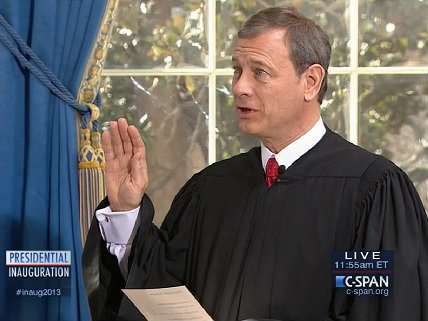John Roberts' Judicial Abdication
Did the chief justice betray legal conservatism? Not exactly.

American conservatives are furious once again with Chief Justice John Roberts. For the second time in three years, Roberts has led the Supreme Court in saving the Patient Protection and Affordable Care Act from legal doom. In 2012 Roberts upheld Obamacare's constitutionality. Yesterday, in King v. Burwell, he interpreted the law in accordance with the wishes of the Obama administration to allow tax credits to be available in connection with federally established health care exchanges.
Writing at The Week, conservative pundit Matt K. Lewis says "John Roberts abandoned conservatives" in King v. Burwell and abandoned "the conservative legal philosophy [he] is supposed to hold true to."
In a word, no. John Roberts may have infuriated many conservatives, but that's not the same thing as abandoning his conservative legal philosophy. In fact, when you take a closer look, you'll find that Roberts' behavior in the two Obamacare cases is quite consistent with one particular school of conservative legal thought. That school is committed to the idea of judicial deference.
Judicial deference is not necessarily a conservative legal idea. Once upon a time it was broadly accepted by American progressives. But thanks in large part to the massive influence of conservative legal theorist Robert Bork over the past 40 years, deference became a mainstream idea on the legal right. "In wide areas of life," Bork famously argued, "majorities are entitled to rule, if they wish, simply because they are majorities." In the approving words of National Review editor Ramesh Ponnuru, this approach "is best understood as a finger on the scales, tipping judges in close cases against invalidating the actions of Congress or state or local governments."
Sound familiar? "It is not our job," John Roberts wrote in 2012, tipping the scales in favor of Obamacare, "to protect the people from the consequences of their political choices." He tipped the scales once again yesterday in King v. Burwell. "In every case we must respect the role of the Legislature, and take care not to undo what it has done."
Whether conservatives like it or not, John Roberts is the heir to a well-established school of conservative legal philosophy.
What's more, conservatives have no business acting surprised about it.
Ten years ago this week, the Supreme Court issued its notorious decision in Kelo v. City of New London, the eminent domain case in which the Court allowed government officials to bulldoze a working-class neighborhood on behalf of a private developer. Given "our longstanding policy of deference to legislative judgments in this field," the Court ruled, it had no choice but to bow down before the city's desire to seize private property.
A few months after Kelo was released, the Senate Judiciary Committee held its hearings on the confirmation of John Roberts to be the next chief justice of the United States. Not surprisingly, Kelo was a topic of much concern among Senate Republicans. They wanted to know if Roberts shared their outrage about the Court's judgment and if Roberts agreed that Kelo was a judicial travesty that should be overturned as soon as possible.
But Roberts was not so quick to concur with that negative assessment. In fact, Roberts argued that Kelo had a silver lining. The Court's ruling, Roberts said, "leaves the ball in the court of the legislature, and I think it's reflective of what is often the case and people sometimes lose sight of, that this body [Congress] and legislative bodies in the States are protectors of people's rights as well."
It was perhaps the single most revealing moment in Roberts' entire confirmation proceedings. The future chief justice had just used Kelo, one of the worst decisions of the 21st century, to make a subtle yet undeniable argument in favor of judicial deference to legislative bodies. If you don't like what your lawmakers have done, Roberts plainly suggested, take your complaint to the ballot box, not to the courthouse.
It was a clear warning sign of the judicial abdication to come.


Show Comments (100)